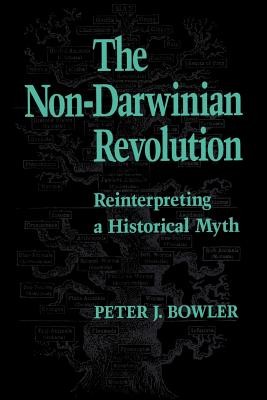
- We will send in 10–14 business days.
- Author: Peter J Bowler
- Publisher: Johns Hopkins University Press
- ISBN-10: 0801843677
- ISBN-13: 9780801843679
- Format: 15.1 x 22.9 x 1.7 cm, softcover
- Language: English
- SAVE -10% with code: EXTRA
Reviews
Description
Concise and clearly written, The Non-Darwinian Revolution sets forth a convincing argument for a reappraisal of Darwin's importance not only for the history of science but for the history of ideas as well. Bowler finds no fault in Darwin's theory, only with the mistaken notion of its revolutionary effect on nuneteenth-century thought. Examining the work of such figures as Owen, Spencer, Kelvin, Huxley, Haeckel, and Freud, Bowler discovers as near-universal tendency to accept evolutionism while rejecting Darwin's central premise: natural selection. Instead, leanding scientists and thinkers stubbornly clung to the Lamarckian theory of evolution as guided, purposeful development until they were forced by the twentieth century's "rediscovery" of Mendelian law to concede otherwise.
--British Journal of the History of Science
EXTRA 10 % discount with code: EXTRA
The promotion ends in 19d.15:52:12
The discount code is valid when purchasing from 10 €. Discounts do not stack.
- Author: Peter J Bowler
- Publisher: Johns Hopkins University Press
- ISBN-10: 0801843677
- ISBN-13: 9780801843679
- Format: 15.1 x 22.9 x 1.7 cm, softcover
- Language: English English
Concise and clearly written, The Non-Darwinian Revolution sets forth a convincing argument for a reappraisal of Darwin's importance not only for the history of science but for the history of ideas as well. Bowler finds no fault in Darwin's theory, only with the mistaken notion of its revolutionary effect on nuneteenth-century thought. Examining the work of such figures as Owen, Spencer, Kelvin, Huxley, Haeckel, and Freud, Bowler discovers as near-universal tendency to accept evolutionism while rejecting Darwin's central premise: natural selection. Instead, leanding scientists and thinkers stubbornly clung to the Lamarckian theory of evolution as guided, purposeful development until they were forced by the twentieth century's "rediscovery" of Mendelian law to concede otherwise.
--British Journal of the History of Science


Reviews